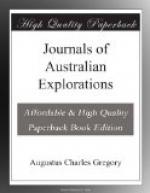22nd September.
The night having been cloudy, and a strong breeze preventing any dew, our horses were not much refreshed; we, however, started at 7.45 a.m., and steering nearly west till 3.15 p.m. through a succession of dense thickets, high scrubs, and thorny bushes, we entered open sandy downs, and changed the course to south-west, with the intention of making the Hutt River, should we not find any water nearer, when, almost hopeless of procuring this essential element before the next day, we unexpectedly came to a native well in the centre of the sandy plain; here we bivouacked at 5.40, but, from the loose sandy soil in which the well was dug, we could not obtain more than about two and a half gallons of water for each horse, the sides of the well continually falling in. Strong breeze from the north-west, and several light showers in the evening and night.
23rd September.
Having completed watering the horses, we left the well at 9.30 a.m., and steering about north-west over undulating sandy downs, covered with coarse scrub and patches of dense thickets, at 2.15 p.m. entered a small gully trending north-west. The country improved, but was so thickly clothed with wattles as to render travelling difficult; a few patches of grass were seen in some small watercourses, in which a little water remained. At 4.40 bivouacked on a large gully trending northwards, with several small pools of water in a rocky bed of gneiss, containing numerous small garnets. Strong breeze from the north-west and slight showers.
24th September (Sunday).
Although the feed for the horses was not very abundant, yet the long marches they had encountered the last few days made it expedient to give them a day’s rest to recruit their weary limbs. Read prayers. Strong breeze from the north-west and slight showers during the day.
Enter the valley of the Murchison river.
25th September.
Started at 8.27 a.m.; passed over poor stony hills of granite formation and producing a little grass in tufts—the wattles growing so close together as to render travelling difficult and tedious. At 10.45 came on a large stream-bed, which had scarcely ceased to run; the channel was fifty yards wide, the bed steep and rocky, and, where crossed, ran over a dyke of trap-rock, the water slightly brackish and in long shallow pools, with samphire on the banks. This stream must be the Murchison River, as no other




